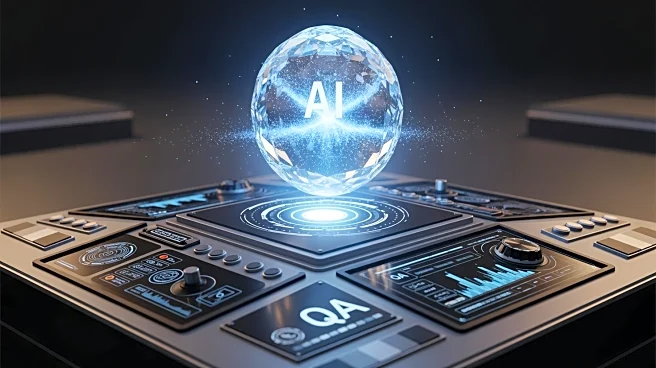What's Happening?
Square Enix has announced plans to significantly reduce its Quality Assurance (QA) workforce, opting to use generative AI for 70% of its game QA and debugging processes. The company aims to establish a competitive
edge in game development through this strategy. Michael Douse, the publishing director of Baldur's Gate 3 developer Larian, has publicly criticized this move, labeling it as 'stupid.' Douse argues that QA personnel are crucial to video game companies, providing essential feedback and serving as a gateway for future industry professionals. He emphasizes that QA roles are not merely entry-level positions but are integral to the growth and development of the industry. Douse also questions the rationale behind not laying off executives if financial savings are so critical, pointing out that the desired savings of $19.6 million are not substantial for a AAA company.
Why It's Important?
The decision by Square Enix to replace human QA workers with AI has broader implications for the video game industry. QA roles have traditionally been entry points for individuals aspiring to enter the industry, and their reduction could limit opportunities for new talent. This shift towards AI could also impact the quality of game development, as human feedback and interaction are vital for understanding player experiences and improving game design. The move reflects a growing trend among game developers to integrate AI into various aspects of production, which could lead to significant changes in employment patterns and industry practices. The criticism from industry figures like Douse highlights concerns about the potential loss of valuable human insight and the long-term effects on the industry's talent pipeline.
What's Next?
As Square Enix proceeds with its AI integration, the company may face backlash from industry professionals and gamers who value the human element in game development. Other companies may observe the outcomes of this strategy and decide whether to follow suit or maintain traditional QA processes. The debate over AI's role in the industry is likely to continue, with stakeholders weighing the benefits of cost savings against the potential loss of human expertise and creativity. The industry may need to address ethical considerations and develop guidelines for AI use to ensure it complements rather than replaces human contributions.
Beyond the Headlines
The shift towards AI in QA roles raises ethical questions about the future of employment in the video game industry. As AI becomes more prevalent, companies must consider the impact on workers and the potential for job displacement. There is also a cultural dimension, as the gaming community values the personal touch and creativity that human developers bring to games. The reliance on AI could alter the industry's culture, affecting how games are developed and perceived by players. Long-term, this trend could lead to a reevaluation of the balance between technology and human input in creative industries.









